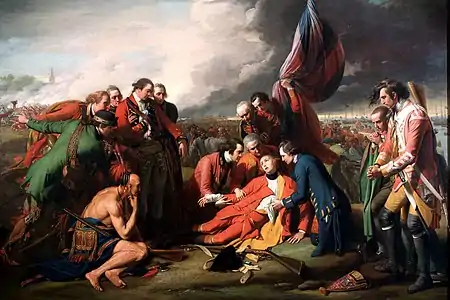1741 in Canada
Events from the year 1741 in Canada.
| |||||
| Decades: |
| ||||
|---|---|---|---|---|---|
| See also: | |||||
| Part of a series on the |
| History of Canada |
|---|
 |
| Timeline (list) |
| Historically significant |
| Topics |
| By provinces and territories |
| Cities |
| Research |
Incumbents
Events
- First Fort Dauphin, was built near Winnipegosis, Manitoba.
- Vitus Bering, in service of Russia, reaches Alaska; Russians soon trade with natives for sea otter pelts.
- Alexei Chirikof, with Bering expedition, sights land on July 15; the Europeans had found Alaska.
- Russians Vitus Bering and Aleksi Cherikov 'discover' Alaska and bring back fur skins (Bering shipwrecked on return and died); the Fur Rush is on.
- The lives of early Alaskans remained basically unchanged for thousands of years, until Russian sailors, led by Danish explorer Vitus Bering, sighted Alaska's mainland in 1741.
- The Russians were soon followed by British, Spanish, and American adventurers. But it was the Russians who stayed to trade for the pelts of sea otters and other fur-bearing animals, interjecting their own culture and staking a strong claim on Alaska. Once the fur trade declined, however, the Russians lost interest in this beautiful though largely unexplored land.
- Fort Bourbon established near present-day Grand Rapids, Manitoba.
- François-Josué de la Corne Dubreuil appointed commandant at Fort Kaministiquia.
Births
- 6 June - Denis Viger, businessman and politician
- 19 September - Jacob Jordan, businessman and politician
- 3 November - Joshua Upham, lawyer, judge and politician
- 6 November - Joseph-Laurent Bertrand, priest
Historical documents
Sloop "Sarah" (Abraham Brasher, captain) lands in Newfoundland with enslaved people purchased in New York[3]
Wanting new trade and discoveries, Hudson's Bay Company countermands Chief Factor Richard Norton's order to stop search for Northwest Passage[4]
Captain seeking Northwest Passage ordered to "cultivate a Friendship and Alliance" with Indigenous people living by "Western American Ocean"[5]
Hudson's Bay Company states objections to Capt. Middleton visiting their forts while searching for Northwest Passage[6]
After much fruitless proselytizing, Jesuit missionary converts everyone at "Mission of l'Assomption among the Hurons" (Note: "savages" used)[7]
Haudenosaunee who bring enslaved Chickasaw to Kahnawake no longer burn them, but adopt and convert them (Note: "savages" used)[8]
Board of Trade warned that Acadians smuggle commodities (sometimes "whole droves of Cattle") to Île-Royale via many east coast harbours[9]
Nova Scotia Council "follow the Antient laws & Customs" of Acadians, except where royal rights or British laws are involved[10]
Council president Paul Mascarene says priests cannot govern "the Temporall by the Spirituall, Incroaching [and] Endeavouring" to rule parishes[11]
Among many warnings, Mascarene says if Acadians devalue British leniency, "we shall find a way to make them repent [slighting] so good an offer"[12]
Council secretary's widow needs his debtors to pay up so she can buy merchandise in Boston to sell and pay his debts[13]
New York lieutenant governor calls for funding of new chapel for Kanien’kéhà:ka, as requested by their sachems[14]
Deed by which Seneca sachems sell large tract of land in Albany County, New York to Crown[15]
Example of music (notes and lyrics) of Indigenous people in Nova Scotia[16]
References
- Guéganic (2008), p. 13.
- "George I". Official web site of the British monarchy. 30 December 2015. Retrieved 18 April 2016.
- Voyage ID 107940 Slave Voyages. Accessed 11 July 2021
- Joseph Robson, Summary of April 23, 1741 letter An Account of Six Years Residence in Hudson's-Bay (1752), pgs. 28-9. Accessed 9 September 2021
- Admiralty instructions to Middleton (May 20, 1741), A Vindication of the Conduct of Captain Christopher Middleton[....] (1743), pgs. 101-2. Accessed 7 September 2021
- Letters of May 27 and 30, 1741 A Reply to the Remarks of Arthur Dobbs, Esq. on Capt. Middleton's Vindication[....] (1744), Appendix pgs. 4-7. Accessed 7 September 2021
- "Letter of Father Armand de la Richardie to Reverend Father Franciscus Retz, General of the Society of Jesus, at Rome" (June 21, 1741), The Jesuit Relations and Allied Documents, Vol. LXIX. Accessed 9 September 2021 http://moses.creighton.edu/kripke/jesuitrelations/relations_69.html (scroll down to Page 49)
- Letter of Father Luc François Nau (October 3, 1741), The Jesuit Relations and Allied Documents, Vol. LXIX. Accessed 9 September 2021 http://moses.creighton.edu/kripke/jesuitrelations/relations_69.html (scroll down to Page 53)
- "Governor Mascarene to Lords of Trade" (November 23, 1741), Nova Scotia Documents; Acadian French, pg. 114. Accessed 9 September 2021
- "Mascarene to Alex. Bourg" (July 2, 1741), Nova Scotia Archives; Governor's Letter-Book, Annapolis, 1719-1742, pg. 151. Accessed 8 September 2021
- "Mascarene to des Enclaves" (January 7, 1741), Nova Scotia Archives; Governor's Letter-Book, Annapolis, 1719-1742, pg. 144. (See elaboration of this warning) Accessed 8 September 2021
- "Mascarene to Alex. Bourg" (September 11, 1741), Nova Scotia Archives; Governor's Letter-Book, Annapolis, 1719-1742, pgs. 156. Accessed 8 September 2021
- "Mascarene to Alex. Bourg" (August 24, 1741), Nova Scotia Archives; Governor's Letter-Book, Annapolis, 1719-1742, pgs. 154-5. Accessed 8 September 2021
- "Proceedings of the Assembly of New-York" The American Magazine, Vol. I (March 1741), pgs. 79-80. Accessed 9 September 2021
- "Deed of surrender of a tract of land in Albany County to the Crown of Great Britain" (January 10, 1741), Library and Archives Canada. Accessed 9 September 2021
- "The History of New-Scotland" The History of Newfoundland (1741?), pg. 37. Accessed 7 September 2021
.svg.png.webp)
